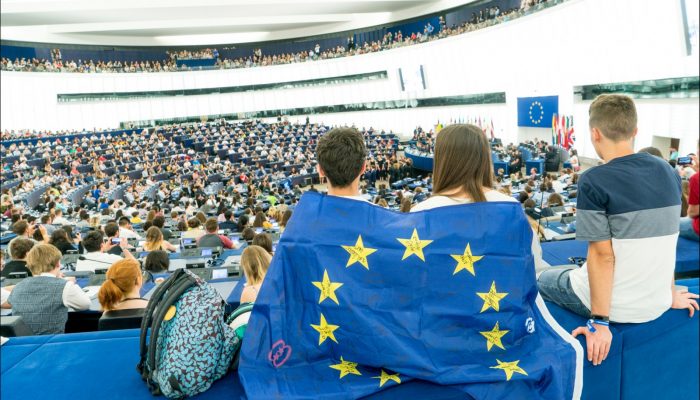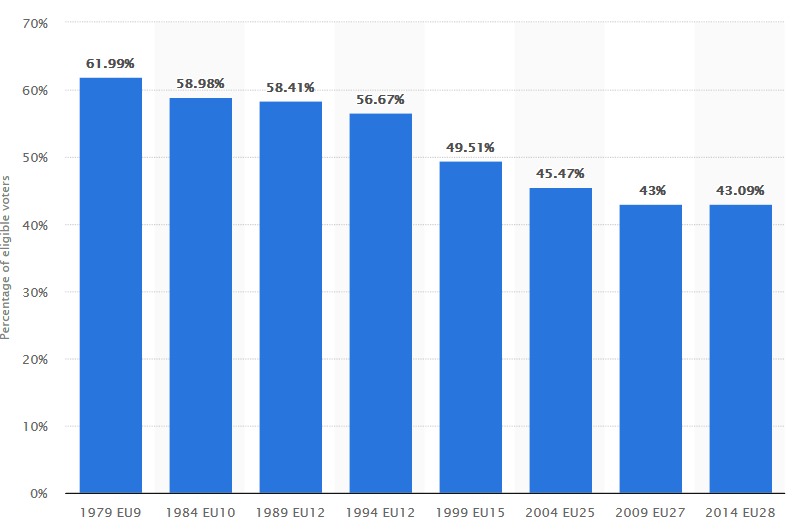
The European Parliament currently has 751 members who belong to one of the eight political groups, at least one of the 20 different committees and represent approximately 500 million people from the 28 EU Member States. The EU Parliament plays an extremely important role in the EU. It oversees the EU budget, launches investigations into specific issues and shares legislative powers with the Council of the EU which means that it can pass, reject and adjust proposals submitted by the EU Commission.
The current parliamentary configuration is often more ambitious than the EU Commission in terms of sustainability, climate targets and funding for science. In November 2018, the Parliament’s Industry, Research and Energy committee called to increase the budget for the EU’s 2021-2027 research and innovation framework programme (Horizon Europe), from the Commission’s proposed €83.5 billion to €120 billion. And ahead of COP24 in 2018, the Parliament voted to increase the EU’s emissions reduction target from 45% to 55% compared to 1990 levels.
However, the current configuration of the EU Parliament is set to change with the upcoming European Parliament Election which will be held from 23–26 May 2019. The European Parliament is the only body of the European Union that is elected directly by EU citizens. Despite this, since the first EU Parliamentary elections in 1979, voter turnout has significantly declined from 62.0% to 43.0% in 2009 and only a slightly higher turnout of 43.1 in 2014 (see Figure 1).

Figure 1: Percentage of EU citizens who voted from the first EU Parliament Election in 1979 until 2014. https://www.statista.com
What do the EU elections decide?
The next European Parliament election will determine who the Members of Parliament (MEPs) will be. There are currently 751 MEPs but this number will be reduced to 705 after the 2019 election as a result of the UK leaving the Union. Each of the soon to be 27 EU Member States (after Brexit) has already been allocated a number of the 705 MEP seats based on the size of their population. The elections in May will decide who, from each Member State, will fill these positions.
The focus and direction of the EU Parliament is dictated by the MEPs elected. Your vote will therefore help dictate the future EU budget, which legislation is passed and what adjustments are made!
Who can vote?
Voting in the European Parliament election is restricted to nationals of EU Member States. Usually, EU nationals are only able to vote for candidates that are standing for elections in their own countries but if you live and are registered in a different EU Member State you can chose to participate in the election of your host country instead. But of course, you can’t vote twice! So, if you are live in a different EU Member State, you will have to decide whether you’d rather vote for a candidate in your host country or your home country.
What about UK citizens?
The UK is scheduled to leave the EU on 29 March 2019 after which UK nationals will no longer have MEPs or the right to vote for them (regardless of where they live).
If you’re an EU citizen living in the UK and want to vote in the European Parliament elections, it is still possible depending on your home country. You can find more information about your country’s specific rules regarding citizens living in the UK here.
National discrepancies
Despite it being a European election, different EU Member States are able to dictate many of key elements regarding the voting process, such as
- which day the polling is open (between 23–26 May)
- the voting system (Figure 2),
- whether voting is compulsory
- the minimum age to be eligible to vote (16 in Austria & Malta, 18 everywhere else)
- whether it’s possible to vote by mail or from abroad
- if there’s a single electoral district or multiple
This section of the EU website can provide you with specific details depending on your nationality and country of residence.

Figure 2: The voting systems of EU Member State and number of MEPs. Source 2019 European Elections national rules
What are some of the concerns for the upcoming election?
As Figure 1 shows, voter turnout is a definite concern. The EU Parliament is attempting to address this through initiatives such as “this time I’m voting“. Hacking and cybersecurity are also potential threats to the election. As European Commissioner for Security Julian King stated, “Given the dispersed nature and comparatively long duration of the European Parliament elections, they present a tempting target for malicious actors”.
Furthermore, there is increasing concern about the prevalence of disinformation. Fake news can easily go viral when individuals fail to fact-check before sharing a link on social media. Bots, that can be controlled by individuals or governments, also have the ability to share fake news, shape online conversations and subsequent discourses. There is evidence to show that such bots have already had an influence on certain EU issues such as immigration in Italy. The EU is already working to combat disinformation with the EU Action Plan against Disinformation which was released by the Commission in December 2018. Key online organisations such as Google, Facebook, Twitter and Mozilla are also expected to release figures on disinformation and the measures that they are taking against it in early 2018.
Increasing nationalism and populism within the EU is another concern with populists gaining traction in many EU countries.
What can you do in the lead up to the election?
Know the voting rules and specifics of the country you will be voting in and make sure you register if your country requires it.
Have an understanding about what issues your country or constituency’s candidates support. Most countries should have an overview of the candidates running closer to the election. Websites such as VoteWatch Europe can tell you how active each current MEP is, how they have voted on particular issues and the initiatives that they’ve been involved with. If a candidate was, for example, involved in the 2017 MEP Scientist Pairing Scheme, they are likely to support science and science for policy.
And this goes without saying for most scientists … don’t spread misinformation! Make sure your sources are reliable and don’t just share an article based on the headline.
Happy voting!
Further reading
- The European Parliament
- European elections
- EU citizens living in UK urged to check eligibility to vote in 2019 EP elections
- Europe’s most hackable election




